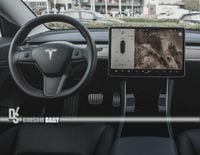On April 17, 2025, China's Ministry of Industry and Information Technology implemented a significant regulatory measure aimed at the automotive industry, banning the use of terms like "smart driving" and "autonomous driving" in advertisements for driving assistance features. This decision follows a tragic incident involving a Xiaomi SU7 sedan that raised serious concerns regarding the safety of advanced driving assistance systems (ADAS).
The ban was announced during a meeting held on April 16, where nearly 60 representatives from various automakers gathered to discuss the new regulations. The ministry emphasized that automakers must now verify the reliability of their ADAS through rigorous testing and obtain regulatory approval before deploying over-the-air updates for vehicles already on the market. This is a crucial step in ensuring that the technologies being promoted are safe and reliable for consumers.
The impetus for this regulatory action stems from a fatal accident in March 2025, where a Xiaomi SU7 sedan crashed into a cement roadside pole at a shocking speed of 97 km/h (approximately 60 mph). Preliminary investigations revealed that the crash occurred seconds after the driver disengaged the ADAS, leading to the vehicle catching fire. Such incidents have heightened public concern over the safety of these technologies, prompting regulators to act decisively.
In the competitive landscape of China's automotive market, companies like BYD have been aggressively promoting vehicles equipped with free "smart driving" features. In February 2025, BYD launched at least 21 affordable models priced below $10,000, intensifying a price war that has persisted for three years. Other automakers, including Leapmotor and Toyota, quickly followed suit, introducing similar offerings to maintain their market positions.
The Ministry of Industry and Information Technology confirmed its meeting with automakers in a brief statement, emphasizing new rules that were published in February aimed at regulating over-the-air updates for intelligent and connected vehicles. Huawei, a major supplier of ADAS to brands such as Audi in China, was present at the meeting, highlighting the involvement of key players in the industry.
China's electric vehicle (EV) market has surged faster than anticipated, with sales of electric and hybrid vehicles accounting for over half of total vehicle sales by late 2024. This rapid growth has outpaced policymakers' expectations, leading to increased scrutiny on both ADAS technologies and EV battery safety standards. Regulators are keen to mitigate risks associated with fire and explosions, which have become pressing concerns as the market expands.
However, analysts warn that the introduction of stricter regulations could lead to increased costs for automakers and potentially slow the pace of technological development. While these measures are aimed at enhancing safety, they may also serve as a catalyst for long-overdue consolidation in China’s overcrowded auto industry, which has been grappling with overcapacity for some time.
The automotive landscape in China is evolving rapidly, and the new regulations reflect a growing awareness of the need for safety and reliability in the face of technological advancements. As automakers navigate these changes, the balance between innovation and consumer protection will be critical.
In conclusion, the recent ban on terms like "smart driving" and "autonomous driving" marks a pivotal moment in China's automotive industry, as regulators seek to ensure the safety and reliability of advanced driving technologies. The tragic incident involving the Xiaomi SU7 sedan serves as a stark reminder of the potential dangers associated with these systems, underscoring the importance of rigorous testing and regulatory oversight.





